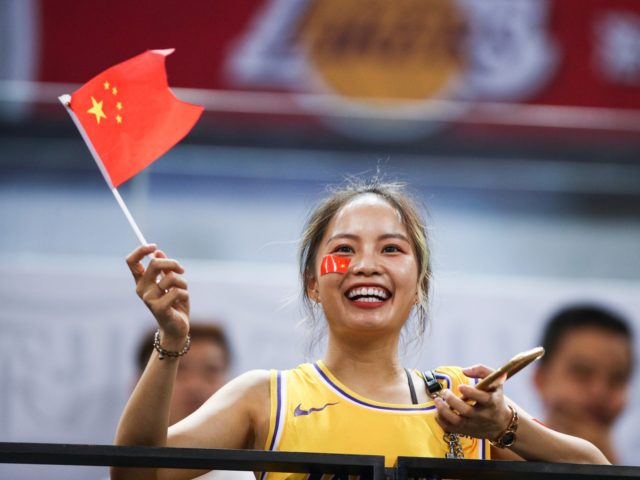The National Basketball Association (NBA) claimed this week to have cut ties with its training camp in Xinjiang, home to the vast majority of China’s Uyghur ethnic minority and over a thousand concentration camps the Communist Party built to enslave them and destroy their culture.
NBA Deputy Commissioner and Chief Operating Officer Mark Tatum revealed the defunct status of the NBA training center in Urumqi in a letter sent to Senator Marsha Blackburn (R-TN) on Tuesday, published a day later on Blackburn’s website. The brief letter answered some questions the senator posed about the NBA’s relationship with China, under intense scrutiny since the sports organization failed to defend Houston Rockets General Manager Daryl Morey from Communist Party outrage over a tweet in which he expressed sympathy with anti-communist protesters in Hong Kong. As a result of Morey’s remarks, the Communist Party banned the airing of NBA games on state television, which Tatum told Blackburn caused “significant” financial damage to the NBA.
“We estimate the loss of revenue to be in the hundreds of millions of dollars,” Tatum said.
Asked directly how the NBA is working to shut down its presence in Urumqi, Xinjiang, Tatum said, “The NBA has had no involvement with the Xinjiang basketball academy for more than a year, and the relationship has been terminated.”
Blackburn issued a statement in response urging other corporations with business ties to Xinjiang to follow the NBA’s lead.
The NBA’s decision to abandon its footprint in Xinjiang, where millions of Muslim Uyghurs have been brutally confined in ‘reeducation camps,’ is the right way to condemn Chinese oppression and should motivate other American corporations to decry such atrocities,” Blackburn said. “Making money and standing up for human rights should not be mutually exclusive.”
Blackburn also noted that the NBA continues to profit from business ties to the regime responsible for building concentration camps for Uyghurs and other Muslim minority members in Xinjiang, suggesting the world was not yet complete.
“The NBA’s partnership with Chinese e-commerce giant Alibaba remains a cause for concern, especially as Alibaba affiliate AntPay prepares for an IPO this year on Shanghai’s STAR market,” Blackburn noted. “Chinese companies are notorious for stealing American intellectual property and technology, and these thefts have cost our businesses billions of dollars in economic losses. The NBA’s continued financial relationship with Alibaba requires a closer look.”
The NBA debuted its partnership with a training camp in Urumqi, as well as two other Chinese cities, in 2016, calling it “an international elite development initiative.” The training camp would reportedly scout for talent in the Uyghur autonomous region and give otherwise underprivileged player the opportunity to play with NBA-level coaching talent.
“Nothing is more important than to grow the game of basketball here in China,” NBA Commissioner Adam Silver said following the announcement of the NBA Xinjiang center in 2016. “We’re thankful for the terrific reception we’ve had in China. It’s very important that we give back as well.”
Silver hoped that the players trained at the center could “bring glory to their country through the national team.”
Chinese officials also emphasized the alleged importance of cultivating basketball talent in the heart of Uyghur country.
“Xinjiang has a large basketball fanbase, and our professional teams in the CBA [Chinese Basketball Association] and WCBA are among the top teams in China,” the director of the Xinjiang basketball center, Nie Chun, said at the time. “Through the NBA’s advanced concepts and training systems, I believe that we will be able to further our youth basketball development and lift the game of basketball to a higher level in Xinjiang.”
While Tatum insisted that the NBA had cut its ties to the Xinjiang training center “more than a year ago,” the NBA boasted of having a presence in Xinjiang on its website as recently as October. The page identified the two NBA representatives at the camp and carried the same Nie Chun quote published elsewhere.
Tatum did not address another aspect of the relationship between the NBA and the Xinjiang Communist Party leadership, responsible for the concentration camps – the steady trickle of over-the-hill NBA players getting jobs with the Xinjiang Flying Tigers, the region’s CBA team. Among players cutting deals with the Flying Tigers are Ian Clark, formerly on the championship-winning Golden State Warriors team, Jarnell Stokes of the Utah Jazz, and former Washington Wizard Kevin Séraphin.
The Xinjiang Flying Tigers reportedly courted Miami Heat star Dwyane Wade in 2018, but failed to come to an agreement.
The Xinjiang concentration camps, which the Communist Party also refers to as “training centers,” are believed to have housed as many as 3 million ethnic Uyghurs and other minorites from the region. As of April, U.S. officials believe that nearly 2 million prisoners remain trapped in the camps. Survivors of the camps have testified to being beaten and tortured with methods such as electroshock; being raped and forced to watch others being raped; being forcibly sterilized and having their unborn children, sometimes the product of the rapes, killed; and being profiled for illegal organ harvesting. The milder activity at the camps includes communist indoctrination in which witnesses say they are forced to pledge loyalty to the Communist Party dictator Xi Jinping and renounce their Uyghur language and their Islamic faith. Uyghurs also say they were subject to slavery, forced to manufacture clothing and other goods later sold around the world.
A study by the Australian Strategic Policy Institute (ASPI) published in March revealed that at least 83 global brands – including sports brands like NBA and technology companies like Apple – have sold products made in factories that Beijing has shipped Uyghur slaves into, both inside and outside of Xinjiang.
Chinese officials have explained away its national slavery program by claiming concentration camp “trainees” had “graduated” from the camps and given “jobs” elsewhere.

COMMENTS
Please let us know if you're having issues with commenting.